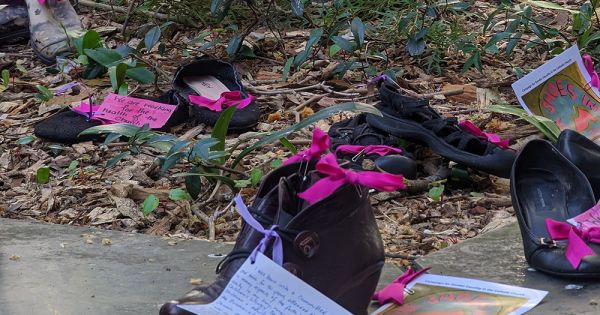Women’s shoes are seen at the “Pink Shoes into the Vatican” event on September 18 in Auckland, New Zealand. (Courtesy of Luc Powell)
Hundreds of Catholic women in New Zealand contributed to a provocative public art protest on September 18 calling for equality for women in the church. The event took place in Auckland, the country’s largest city, and Wellington, its capital.
Called “Pink Shoes into the Vatican,” the event consisted of an installation of hundreds of pairs of shoes donated by women from across the country and lined up in the streets leading to the cathedrals of the two cities.
Attached to each pair of shoes was a tag from its owner describing their contribution or aspirations for the church. Many of them were sincere expressions of sadness and anger or calls for change. A promotional video released before the event showed some of the shoes and their tags.
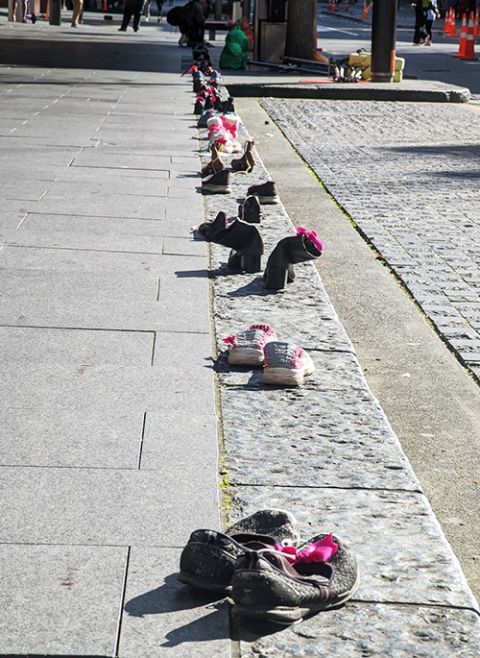
Women’s shoes are seen at the “Pink Shoes into the Vatican” event on September 18 in Auckland, New Zealand. (Courtesy of Luc Powell)
The installation was supported and received by church leaders in the two cities in very different ways. In Auckland, there was a surprisingly positive response. In Wellington, things were a little different.
The event was organized by a group called “Be the Change, Catholic Church, Aotearoa” (Aotearoa is the Maori name for New Zealand). It was formed in 2020, first in Auckland, then in Wellington, by Catholic women who campaign for gender equality in the Church.
Jo Ayers is a founding member of Be the Change in Auckland and one of the organizers of “Pink Shoes into the Vatican”. She holds a master’s degree in anthropology and liturgy, the latter from the University of Notre Dame in Indiana in the United States and teaches at theological colleges in New Zealand. She makes no apologies that the Pink Shoes event was deliberately provocative.
“I have a friend who says we’re in a ministry of irritation,” she told NCR. “We did the ‘Pink Shoes’ event to get people talking about it. It’s to make people aware that there are members of the church, there are women who recognize that the church has really need change and who have already worked out what those changes might be.”
“We hope to reach people in the church, but I’m also interested in people who are on the fringes or have left the church,” she said. “There are a lot of Catholic women who said they had had enough and quit.”
The inspiration for the name of Sunday’s installation was the “Pink Smoke Over the Vatican” protest held in Rome during the 2013 conclave that elected Pope Francis. It was orchestrated by the American group Women’s Ordination Conference. During the conclave, attendees of this event lit pink smoke flares to rival the white smoke that would signal the election of a new pope.
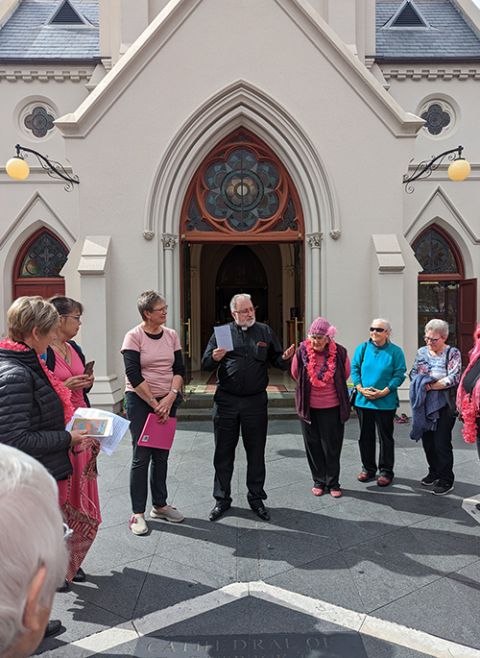
Prof. Chris Denham, Dean of St. Patrick’s Cathedral, Auckland, welcomes attendees to the “Pink Shoes into the Vatican” event in that city on September 18 (Courtesy of Luc Powell)
“Pink Shoes into the Vatican” was to be held the day before Women’s Suffrage Day in New Zealand. Women won the right to vote there on September 19, 1893, making it the first country where women could vote in parliamentary elections.
In Auckland, Jo Ayers and other organizers laid out the shoes along the streets leading from the Suffrage Memorial to St. Patrick’s Cathedral. There they received from Fr. Chris Denham, Dean of the Cathedral, a letter of support from Bishop Stephen Lowe, who was absent from the diocese. Ayers described the atmosphere as festive and non-confrontational.
“It was positive, it wasn’t acrimonious or aggressive,” Ayers said. “The spectators were very interested and a lot of people asked us about it. It’s the anniversary of women’s suffrage and we are saying through our event that while women can run New Zealand – we have had women as Prime Minister, Governor General and Chief Justice – in the church we are second class and we tell the church it’s time for a change.”
In Wellington, the shoe placement began at Parliament House and ended at Sacred Heart Cathedral a few blocks away. Cecily McNeill is the founder of Be the Change in Wellington and one of the organizers of the “Pink Shoes” event. She said she has been active in the church all her life, leading church music and being involved in social justice groups. She has a degree in theology and was editor of the archdiocesan newspaper for nine years. She says religious and clergy were notably absent from the “Pink Shoes” event except for one priest who was sympathetic.
“There was only one priest there, an elderly Marist, and he brought up a few points,” McNeill told NCR. She said the priest compared the treatment of women in the church to the treatment of slaves.
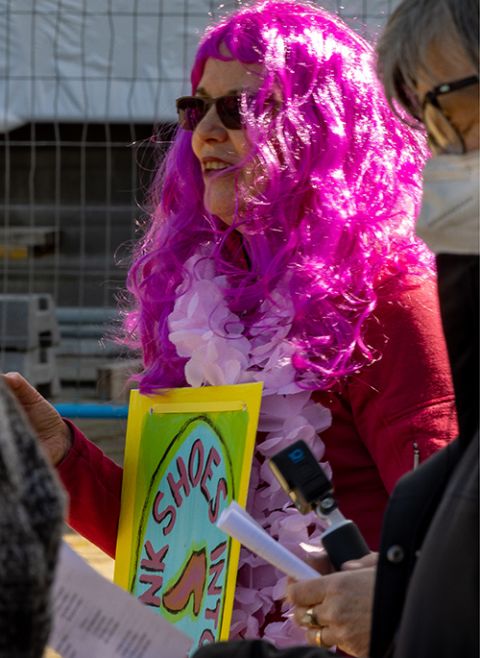
Cecily McNeill, founder of “Be the Change” in Wellington, at the event in that city on September 18 (Courtesy of John Murphy, CathNews New Zealand)
“You go to any church before mass and there are a lot of women getting ready for liturgy or making music, and you don’t see a lot of men doing that kind of stuff,” said McNeill. “And of course, few women are paid for this kind of work.”
McNeill said Wellington Cardinal John Dew initially supported the “Pink Shoes” event. But as the time for its staging approached, it was absent from the archdiocese and the women had to work with Coadjutor Archbishop Paul Martin. When they asked Martin if they could advertise the event in Wellington parishes, he declined, McNeill said.
In an email McNeill shared with NCR, Martin said the event was “more about making a statement and advancing a particular point of view, rather than strengthening the community of the Church.”
NCR approached Martin for further explanation of why he refused the women’s request and he responded by saying that other than his letter to McNeill he had “no further comments to make on the matter.” .
In contrast, Lowe in Auckland apologized in his letter to the organizers of “Pink Shoes” for not being able to join their event. He called it a “hikoi“, a Maori word indicating “journey with purpose”.
Lowe also referenced the New Testament account that Mary Magdalene was the first person to see the risen Jesus, and when she told the disciples, they did not believe her.
“It is perhaps a poignant reminder that the Twelve and their successors can be wrong,” Lowe wrote. “May we have the courage not to get stuck in structures that are not necessarily of God.”
Lowe also thanked the organizers for a pair of women’s shoes they had given her at a previous meeting.
“They stay in my office and are definitely a talking point,” he said. “They also remind me that I too need to be the change. way to the Kingdom of God.”
Ayers said she was thrilled with Lowe’s response and pleasantly surprised by her use of the female pronoun “She” for the Holy Spirit.
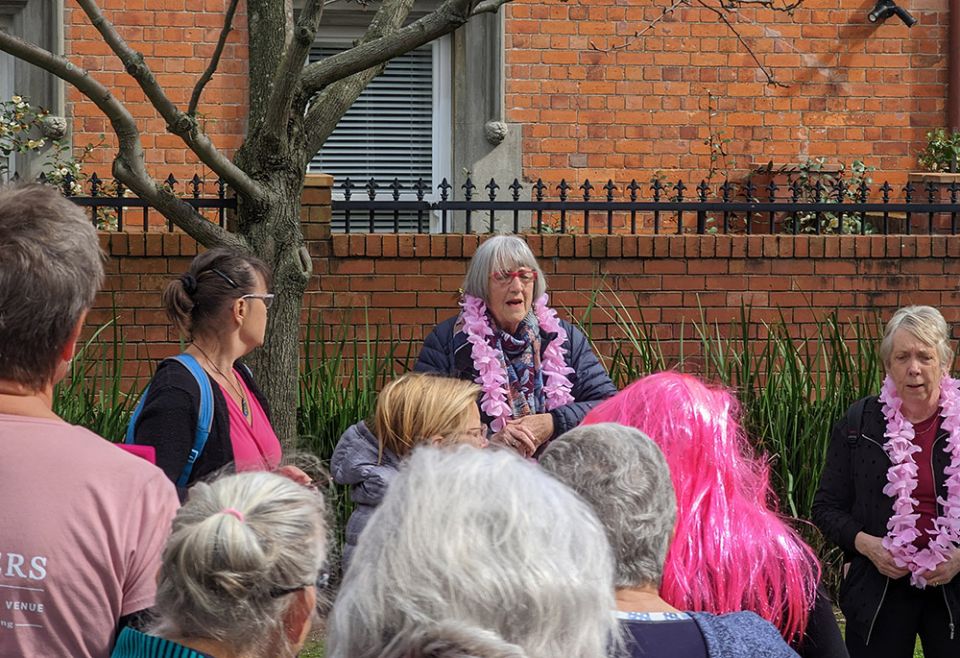
Jo Ayers, founding member of “Be the Change” in Auckland, speaking at the event in that city on September 18 (Courtesy of Luc Powell)
“He’s making a big theological statement there, he’s on board,” Ayers said. “You can’t define the gender of God. God is male and female. We try to describe God, but we can’t. And the use of the female pronoun causes people to recognize that our traditional view of God as old man, or young man, or whatever, we just have to get by.”
Ayers said she was greatly encouraged by the “Pink Shoes” event and Lowe’s support. She said she planned to invite the bishop to attend his Sunday worship community.
In Wellington, McNeill isn’t so optimistic about changes for women in the church.
“It’s been almost 60 years since Vatican II began and not much has changed,” she said. “Actually, I think we’ve backed off. There’s a lot of things that happened to Vatican II that were lost. I’m hopeful because that would be beyond me as a Christian in don’t have hope, but I’m not very optimistic.”
Enter your email address to receive free newsletters from NCR.

